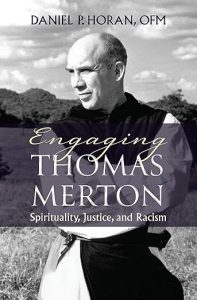 Summary: A variety of essays or talks about Merton and how his life and work can impact people today.
Summary: A variety of essays or talks about Merton and how his life and work can impact people today.
Engaging Thomas Merton is a book you can dip in and out of because while the book is thematically about Thomas Merton, you can easily skip around chapters based on your interest or read it slowly over time. I spent about six or so weeks slowly working through the book.
Because of my interests, I think the most engaging chapters were chapter 6 (using Merton’s work on the true and the false self to engage ideas of how we are embodied and digital selves) and then the three chapters about Merton’s engagement with the civil rights movement.
Overall, I think the digital self chapter is probably both the best chapter of the book and worth the price of the book for me. Horan makes the case that Merton would have seen that one of the realities of the digital age is that identity is “almost infinitely negotiable.” As a means of engaging with Merton in a situation that Merton didn’t experience, Horton takes Merton’s understanding of the false self and engages those insights. The clearest summary of Horton’s thesis here is, “The true self only appears elusive because we are too concerned with our false self (selves) to turn toward God.” (p93)
But that simple statement doesn’t get us to a point where we can do something about working toward our true selves. Knowing the truth doesn’t help us move toward the truth, especially when we are tempted to believe that methods of instant gratification might work. Jacque Ellul argued against “techniques” that solve our spiritual problems. Similarly to how Ellul argued against technique, Merton approached the true and false self not as a problem to be solved, but as an “entire lifestyle shift.” As Horton summarizes, “Precisely because this focus on the need for instant gratification is so deeply ingrained in the false self, Merton explains that real and substantial changes in the way one relates to others and sees the work must become priority. And this takes time.” (p99)
I think one of the most helpful turns of the Digital Self essay is an exploration of vocation as a solution to the false self.
“Merton explains what a vocation means: Each one of us has some kind of vocation. We are all called by God to share in His life and in His Kingdom. Each one of us is called to a special place in the Kingdom. If we find that place we will be happy. If we do not find it, we can never be completely happy. For each one of us, there is only one thing necessary: to fulfill our own destiny, according to God’s will, to be what God wants us to be.63 In other words, what Merton is saying to us is that we are not created simply to fabricate a future shaped by our fantasies or to go forward in life unaided by the Creator. He intends quite the opposite. Through prayer and discernment one comes to recognize that God has given each person certain gifts, including skills, talents, dispositions, interpersonal abilities, intellect, personality, emotional and other forms of intelligence, and the like. Merton asserts that we are most happy when we deploy those God-given gifts within the state of life we find ourselves and come to live our true self in community. This is certainly a challenge for digital natives, who have been reared in a context in which identity is so unstable. Today’s young adults look around and see a context that encourages ways of going about the world that are far from the image of self-understanding and spirituality present in Merton’s explanation of what it means for everyone to have a vocation given by God.” (p 101)
The other chapters that I was particularly interested in were the chapters on race. I think the juxtaposition of the chapters is helpful. Two of the chapters explore some of the ways that Merton’s thinking about race prefigured the later developments of thinking about race, especially critical race theory. Horan suggests that Merton’s understanding of racism is ultimately a white problem, and that change would not happen until white people choose to allow changes in a similar way to how Derek Bell understood interest convergence. And that Merton understood race as a social construct, not a biological reality as Bell and other critical race theorists have posited were interesting suppositions of how Merton may have developed his thought had he lived past 1968. (It was enough that I picked up but have not read Merton’s Faith And Violence, the last book he had ready for publication before his death.) And Merton thought of racism as a type of violence, which again is language that was developed more fully in the decades since Merton’s death.
But the last chapter on race primarily looks at areas of weakness for Merton on racial issues. Merton did approach racial issues in a more helpful direction than many of his white Catholic contemporaries. However, he was still shaped by his culture and had areas of sin, and where change was necessary.
There are other areas of the books that I think were helpful, longer discussions of vocation, of environmentalism, of engaging other religions. But I also think that most people will not be interested in a whole book on the modern use of Merton. Some of these essays are available in digital formats outside of the book. But if you can find the book in the library or for cheap, I think many people will find at least a couple of the essays engaging and helpful.
Engaging Thomas Merton: Spirituality, Justice, and Racism by Daniel Horan Purchase Links: Paperback, Kindle Edition
2 thoughts on “Engaging Thomas Merton: Spirituality, Justice, and Racism by Daniel Horan”